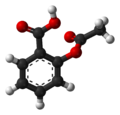Aspirin: Difference between revisions
No edit summary |
CSV import |
||
| Line 174: | Line 174: | ||
[[Category:Antipyretics]] | [[Category:Antipyretics]] | ||
[[Category:NSAIDs]] | [[Category:NSAIDs]] | ||
<gallery> | |||
File:Aspirin-skeletal.svg|Aspirin | |||
File:Aspirin-B-3D-balls.png|Aspirin | |||
File:Aspirin synthesis.svg|Aspirin | |||
File:Acetylation of salicylic acid, mechanism.png|Aspirin | |||
File:PTGS2 inhibited by Aspirin.png|Aspirin | |||
File:Aspirine-1923.jpg|Aspirin | |||
File:Old Package of Aspirin.jpg|Aspirin | |||
File:Bayer Aspirin and store-brand generic on Canadian drugstore shelf.jpg|Aspirin | |||
File:Bayer and store-brand aspirin containers on US drugstore shelf.jpg|Aspirin | |||
</gallery> | |||
Revision as of 00:45, 20 February 2025
| Acetylsalicylic acid | |
|---|---|

| |
| INN | none |
| Drug class | Nonsteroidal anti-inflammatory drug (NSAID) |
| Routes of administration | Oral, rectal |
| Pregnancy category | |
| Bioavailability | 80–100% |
| Metabolism | Liver (CYP2C19 and possibly CYP3A), some hydrolysed to salicylate in the gut wall |
| Elimination half-life | Dose-dependent; 2–3 h for low doses (100 mg or less), 15–30 h for larger doses |
| Excretion | Urine (80–100%), sweat, saliva, feces |
| Legal status | |
| CAS Number | 50-78-2 |
| PubChem | 2244 |
| DrugBank | DB00945 |
| ChemSpider | 2157 |
| KEGG | D00109 |
Aspirin, scientifically known as acetylsalicylic acid, stands as one of the most ubiquitously employed analgesic and antipyretic medications across the globe, boasting over a century of clinical application.
Introduction
Derived from salicylate, Aspirin has not only served as a remedy for pain and fever but has demonstrated efficacy in lowering risks associated with cardiovascular events like heart attacks, clot-induced strokes, and circulatory complications. Many healthcare professionals vouch for and prescribe aspirin for its cardioprotective qualities, especially for patients diagnosed with cardiovascular diseases or those with a history of cardiac or cerebrovascular events.
Benefits and Risks
Benefits
- Cardiovascular Protection: Daily consumption can aid in decreasing the chances of heart attacks, clot-associated strokes, and circulatory disturbances.
- Neurological Advantages: Those with compromised cerebral circulation might benefit from aspirin therapy.
Risks
Despite its therapeutic advantages, aspirin isn't devoid of potential risks. Complications may include:
- Stomach bleeding
- Cerebral hemorrhage
- Kidney dysfunction
- Stroke susceptibility
It's paramount that patients discuss with health professionals to strike a balance between benefits and potential adverse reactions.
Liver Safety
High doses of aspirin might pave the way for liver injuries. This includes marked elevations in serum aminotransferase, occasionally accompanied by jaundice. Particularly vulnerable are children with febrile illnesses; they might develop Reye syndrome upon exposure to even lower doses.
Mechanism of Action
Classified under nonsteroidal anti-inflammatory drugs (NSAIDs), aspirin acts by inhibiting cyclooxygenases (Cox-1 and Cox-2), enzymes responsible for proinflammatory prostaglandin synthesis, which are mediators for pain and inflammation. Unique to aspirin is its irreversible and noncompetitive inhibition of Cox-1, making its effects relatively persistent. This potent and prolonged action also accounts for aspirin's association with gastric irritations and bleeding.
Clinical Uses
Aspirin's therapeutic application spans:
- Mild to moderate pain relief stemming from diverse causes including headaches, traumas, menstrual cramps, and various arthritic conditions.
- Management of juvenile rheumatoid arthritis, systemic lupus erythematosus, rheumatoid arthritis, acute rheumatic fever, and Kawasaki disease.
- Fever management, albeit not recommended for young individuals due to the Reye syndrome risk.
- Prophylactic use in atherosclerosis and post-coronary interventions, typically at a dose of 81 mg daily.
FDA Approval
The US welcomed aspirin's clinical introduction in the early 20th century. Presently, it graces many medicine cabinets as an over-the-counter staple, available in its pure form or combined with various other drugs.
Dosage and Administration
Typical aspirin dosage ranges between 330 to 660 mg, administered every 4 to 6 hours. For its antiplatelet benefits, particularly in preventing atherosclerotic complications, 81 mg once daily is the norm.
Brand Names
Aspirin is marketed under various commercial names, including:
See Also
| Salicylates |
|---|
|
|
| Antithrombotic agents | ||||||||||
|---|---|---|---|---|---|---|---|---|---|---|
* Category
|
-
Aspirin
-
Aspirin
-
Aspirin
-
Aspirin
-
Aspirin
-
Aspirin
-
Aspirin
-
Aspirin
-
Aspirin
- Pages with broken file links
- Antithrombotic agents
- Drugs
- Aspirin
- 1897 in Germany
- 1897 in science
- Acetate esters
- Acetylsalicylic acids
- Antiplatelet drugs
- Drugs developed by Bayer
- Brands that became generic
- Chemical substances for emergency medicine
- Commercialization of traditional medicines
- Covalent inhibitors
- Equine medications
- German inventions
- Hepatotoxins
- Nonsteroidal anti-inflammatory drugs
- Salicylic acids
- Salicylyl esters
- Medications
- Analgesics
- Antipyretics
- NSAIDs





